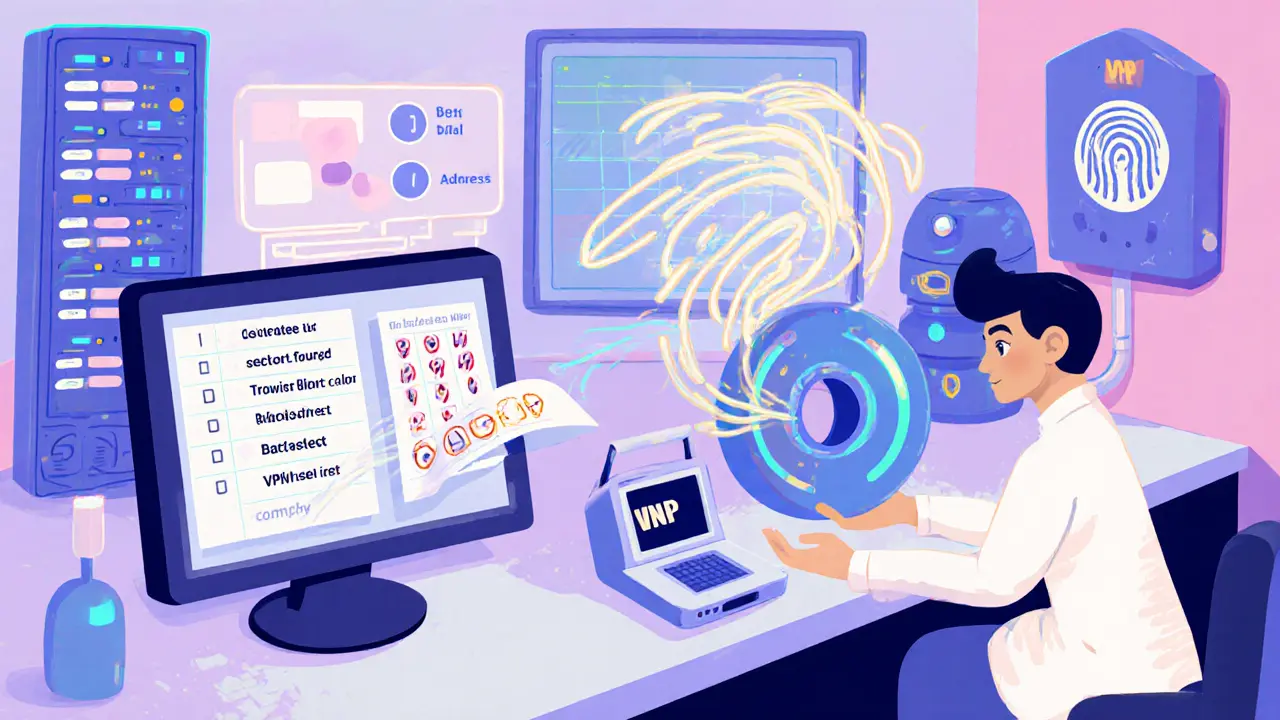Bybit Geofencing & VPN Detection Simulator
Check Your VPN Setup
Detection Risk Assessment
Recommended Actions
- Do not use a VPN if your physical location is restricted
- If in permitted regions, use a reputable VPN provider with static IP addresses
- Ensure your KYC document matches your actual location
- Consider a licensed exchange if you're in a restricted jurisdiction
Imagine trying to log into your favorite crypto exchange, only to be blocked because the platform thinks you’re in a restricted country. That’s the reality for many traders trying to access Bybit a leading cryptocurrency derivatives exchange that serves millions of global users. The exchange relies on a mix of Geofencing a virtual fence that blocks traffic from specific jurisdictions based on IP‑based location data and VPN detection technology that tries to spot traffic routed through virtual private networks. If you’re a trader, you’ll want to know how these controls work, why they exist, and what you can (and can’t) do about them.
Quick Takeaways
- Bybit blocks access from the United States and other restricted jurisdictions using IP‑based geofencing.
- Standard commercial VPNs can often bypass the fence because Bybit’s detection is basic.
- Advanced detection methods (device fingerprinting, timing analysis) are still limited on Bybit.
- Violating Bybit’s terms can lead to account freezes, fund seizures, or legal scrutiny.
- Future upgrades may include machine‑learning risk scoring and tighter KYC cross‑checks.
Why Bybit Uses Geofencing
Regulators in the United States a jurisdiction with strict crypto licensing requirements have cracked down on offshore exchanges that don’t hold a domestic license. Bybit’s Terms of Service explicitly forbid users from the U.S., Canada’s provinces with similar restrictions, and a handful of other regions. The simplest way to enforce that rule is to stop traffic coming from IP ranges associated with those countries - that’s the core of geofencing.
Jake Chervinsky, a well‑known crypto lawyer, described geofencing as a “last‑ditch” compliance move when a platform can’t meet a regulator’s standards. Bybit chose this route instead of building a full U.S.‑compliant subsidiary like Binance did with Binance.US. The trade‑off is clear: keep a single global platform, but block a lucrative market.
How IP‑Based Geofencing Works on Bybit
When you first visit Bybit’s website or launch its mobile app, the platform checks the IP address that your device presents. That address is looked up in a geo‑IP database (think MaxMind or IP2Location) which maps the address to a country. If the result is a restricted nation, the login page pops up with a generic “service not available in your region” message.
Bybit adds a second layer during account creation: the KYC screen asks for a government‑issued ID. The exchange cross‑references the ID’s issuing country with the IP country. In theory, a mismatch should raise a flag, but the CoinDesk cryptocurrency news outlet that investigated Bybit’s controls investigation showed the check is easily sidestepped. Users simply switch to a VPN server in an allowed country before uploading a foreign passport, and the system accepts the data at face value.

VPN Detection - What Bybit Currently Does
Detecting VPN traffic is tougher than spotting an IP address because VPN providers own many IP ranges that appear perfectly legitimate. Bybit’s current detection relies on three basic tactics:
- Maintaining a blacklist of known VPN IP blocks (often outdated).
- Checking for rapid IP changes during a single session.
- Looking for mismatched device/browser fingerprints.
In practice, commercial VPNs like NordVPN, ExpressVPN, or free services on app stores aren’t on the blacklist, and the IP change check can be avoided by staying connected to the same VPN server throughout the session. The fingerprinting step is also weak because Bybit doesn’t enforce strict hardware IDs or TLS certificate pinning.
That’s why the workaround shown in the CoinDesk video still works: a user connects to a U.S. IP, switches to a VPN server in, say, Estonia, and then completes KYC using an Estonian passport photo that belongs to a friend. Bybit sees a consistent Estonian IP and ID, and it lets the account through.
Comparison: Bybit vs. Other Major Exchanges
| Exchange | Geofencing Scope | VPN Detection Strength | Compliance Model |
|---|---|---|---|
| Bybit | Blocks US, Canada (certain provinces), and other high‑risk jurisdictions | Basic IP blacklist + simple fingerprint check | Off‑shore platform with geofence as compliance fallback |
| Binance | Operates separate Binance.US for American users; global platform blocks US IPs | Advanced VPN fingerprinting, rate‑limit anomalies | Hybrid: licensed US entity + offshore service |
| Coinbase | No geofence - fully licensed in US and EU | Not applicable (no blocking) | Regulated broker‑dealer model |
| Kraken | Licensed in US, but still blocks some sanctioned countries | Uses device fingerprinting and VPN detection vendor | Hybrid licensing approach |
As you can see, Bybit sits in the middle. It’s stricter than a fully licensed exchange like Coinbase but less sophisticated than Binance’s dedicated VPN‑blocking service.
Security Implications of Weak VPN Detection
Geofencing isn’t just about obeying regulators; it also protects the exchange from a wave of high‑risk users who might be trying to hide illicit activity. When VPN detection is weak, two problems arise:
- Money‑laundering risk: Bad actors can mask their true location, making AML checks harder.
- Regulatory backlash: If a regulator discovers that a platform easily lets restricted users in, fines or forced shutdowns can follow.
Bybit’s biggest security headline in 2024 was the $1.4 billion hack on its SAFE Wallet the multi‑signature wallet used for user withdrawals on Bybit. The breach was traced to malicious code injected into the wallet’s front‑end, allowing attackers to masquerade as legitimate transactions. While the hack wasn’t directly linked to geofencing, it showed how a compromised platform can struggle to keep compliance tools up to date.
After the incident, Bybit hired Mandiant a leading cyber‑security firm acquired by Google Cloud to audit its security posture. Part of the audit included reviewing how well the exchange could identify spoofed IPs and VPN traffic. The report recommended adding machine‑learning models that flag irregular login patterns - a step Bybit has yet to fully implement.

What Traders Can (Legally) Do
If you happen to live in a restricted jurisdiction, the safest route is to respect the terms: do not use Bybit, or consider a compliant exchange that offers a local license (e.g., Coinbase, Kraken). Trying to hide behind a VPN violates the agreement and can trigger account closure. Even if you manage to trade, any profit could be frozen if the platform later identifies the violation.
For traders outside restricted zones, there are still best practices:
- Use a secure, reputable device and keep your browser updated - this reduces the chance your traffic is flagged as suspicious.
- Enable two‑factor authentication (2FA) to protect against account takeover.
- Monitor your IP address regularly with tools like whatismyip.com to ensure you haven’t been unintentionally routed through a VPN server located in a blocked region.
Keeping your account clean helps Bybit maintain its compliance reputation, which benefits all users by avoiding sudden shutdowns.
Future Outlook: Toward Smarter Geofencing
Experts agree that basic IP blocking will soon give way to more nuanced systems. A February 2025 SSRN paper titled “Crypto Security in the Aftermath of the Bybit Hack” suggested three upgrades that could make Bybit’s fence harder to jump:
- Machine‑learning risk scoring: Analyzing login velocity, device entropy, and network latency to spot VPN‑like behavior.
- Device fingerprint aggregation: Combining browser, OS, and hardware data to create a unique user “signature” that persists across IP changes.
- Real‑time document‑IP verification: Using AI to compare the visual features of ID documents with the apparent location of the IP address, flagging mismatches automatically.
If Bybit invests in these tools, it could reduce the number of successful workarounds while still keeping the platform open to legitimate global traders. Until then, the onus remains on users to stay within the rules.
Key Takeaways for Traders
- Bybit’s geofencing blocks US and other high‑risk regions via IP lookups.
- Standard VPNs can still get you in; the detection is not yet advanced.
- Violating the terms risks account freeze and potential legal issues.
- Future upgrades may incorporate AI‑driven behavior analysis, making workarounds harder.
- For compliance‑focused trading, consider licensed exchanges if you’re in a restricted jurisdiction.
Can I use a free VPN to access Bybit from the US?
Technically you can, and many users have reported success. However, it breaches Bybit’s Terms of Service and can lead to account suspension or fund seizure if detected.
Why does Bybit block US users instead of getting a US license?
Obtaining a US license involves costly compliance infrastructure and ongoing regulatory reporting. Bybit chose the cheaper, quicker route of geofencing to stay global without meeting US‑specific requirements.
What signs indicate my account might be flagged for VPN use?
Unusual IP changes, mismatched ID country vs. IP location, or repeated login failures can trigger internal alerts. If you receive an email about “account verification,” it may be because the system spotted inconsistent data.
Is Bybit’s geofencing likely to get stricter in the near future?
Industry trends suggest yes. Regulators are tightening global crypto rules, and exchanges are adopting AI‑driven detection to stay compliant. Bybit has hinted at upgrades, so expect more sophisticated checks.
Should I switch to a licensed exchange if I’m in a restricted country?
Yes. Licensed exchanges like Coinbase or Kraken operate under local regulations, meaning you can trade legally and keep your funds safe from sudden bans.

6 Comments
rachel terry
Look i get it you wanna trade but pretending you’re not in the US is just silly
Bybit isn’t some underground bazaar it’s a regulated entity that chose not to play ball with the US because licensing is expensive and annoying
Why do people think they’re clever when they’re just gambling with their funds
Susan Bari
Oh honey the geofencing is a joke
My cousin in Cape Town used a free VPN and a fake Estonian ID and got verified in 12 minutes
Bybit doesn’t care they just want to say they ‘block’ the US so they can sleep at night
The real risk isn’t getting caught its that your account gets frozen mid-leverage trade and you lose everything because some algorithm decided your mouse movements looked ‘suspicious’
Sean Hawkins
There’s a critical distinction here between circumventing geofencing and understanding the compliance architecture behind it.
Bybit’s current detection stack relies on legacy IP blacklists and rudimentary device fingerprinting which are easily bypassed by commercial-grade VPNs with rotating exit nodes.
However, the legal exposure isn’t limited to TOS violations-it triggers potential AML/KYC breaches under FATF guidelines, especially when document spoofing is involved.
Moreover, the Mandiant audit post-hack explicitly flagged insufficient behavioral anomaly detection as a systemic vulnerability.
Future iterations will likely integrate ML-driven behavioral biometrics-login velocity, keystroke dynamics, TLS fingerprint entropy-which will render current workarounds obsolete.
Traders outside restricted jurisdictions should still enforce 2FA and avoid public Wi-Fi for KYC uploads, as session hijacking remains a vector for account compromise.
Compliance isn’t about trust-it’s about operational continuity. Exchanges that fail to adapt face regulatory extinction, as we saw with Gate.io’s delisting in 2023.
For US-based users, the only sustainable path is licensed platforms like Kraken or Coinbase, which absorb compliance costs to ensure fund safety and legal recourse.
It’s not about restriction-it’s about risk mitigation at scale.
Marlie Ledesma
I just feel bad for people who get their accounts frozen after putting in months of work
They’re not trying to cheat the system they just want to invest and maybe make a little extra
And then one day the app says ‘sorry we can’t verify you’ and all their trades vanish
It’s not fair and no one really talks about how emotional that is
Daisy Family
sooo… you’re telling me i cant use my free vpn from the 2016 app store to trade btc from my moms basement
cool cool cool
and the fact that bybit lets you upload a passport from a country you’ve never visited is just a ‘feature’ right
lmao
Paul Kotze
Interesting read. I’m based in South Africa and have used Bybit for over two years without issues.
My advice to anyone thinking of bypassing geofencing: don’t.
It’s not just about getting caught-it’s about the precedent.
When exchanges allow this, they become targets for regulators who then shut down entire services, hurting everyone.
I’ve seen friends lose everything because they thought ‘it’s just a VPN’.
Better to use Kraken or Luno if you’re in a restricted zone.
And yes, the detection is weak now-but AI is coming fast.
Bybit’s next update will likely flag users who log in from the same device but switch IPs every 3 days.
It’s not paranoia-it’s math.